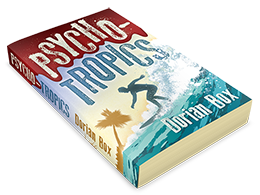 Is it important to get your facts straight when writing non-fantasy fiction? Not just the internal consistency of the “facts” you make up, although that is also important. Or improbable events that require some suspension of disbelief. I’m referring to objectively verifiable facts from the outside world. And the answer is … drum roll … “well, it depends.”
Is it important to get your facts straight when writing non-fantasy fiction? Not just the internal consistency of the “facts” you make up, although that is also important. Or improbable events that require some suspension of disbelief. I’m referring to objectively verifiable facts from the outside world. And the answer is … drum roll … “well, it depends.”
Most (here, here) writers agree that factual accuracy is important in fiction, although it all depends on the context and writer’s expressed intent. In historical fiction, for example, there’s an obvious argument that factual accuracy is especially important because it is purportedly based on real people and events, although an author can disclaim that intent at the beginning and all is well.
Overall, I think most writers would agree that stories represented as transpiring in the real world should be factually authentic in most respects. Writers of medical or legal thrillers obviously need to understand and get terminology and procedures correct, for example. But the same holds true of any specialized job (pilot, cocktail server, beach bum) or activity. Places and the people who inhabit them should be accurately described (climate, culture, accents), although specific locations are best fictionalized, especially if bad things happen there. You don’t want to make your real local bar the scene of a mass murder or drug trafficking operation. (See my post on legal issues facing indie writers.)
But do fiction writers need to be scrupulously accurate with all facts, even general facts, or is there literary license to make the real world conform to fictional worlds?
Due to a combination of academic background and OCD-ness, I’m a fan of making reasonable efforts to get all but the most insignificant facts correct, including All the Small Things (a Blink-182 song our band covers–good tune).
Why is beginning-to-end factual accuracy important in a made-up story? Because even though “fake facts” as to tangential matters may slip by many readers unnoticed, they won’t slip by everyone. Some readers may even post reviews criticizing your book on that basis. When I spot large factual inaccuracies in a novel, it detracts from the reading experience. I start to question other things. Credibility is damaged.
Verifying facts and accommodating your novel to fit them takes some time, but the internet makes it relatively painless. If you’re a good Googler, many assumptions can be confirmed or rejected in seconds.
Examples from The Hiding Girl
I’m currently polishing the manuscript for my second novel, The Hiding Girl. (For any agents out there, The Hiding Girl advanced to the semifinals for the 2017 Publishers Weekly BookLife Prize. It received near-perfect scores (9.5/10) and critique comments such as “exceptional,” deeply atmospheric,” and “without peer.” Read the Publishers Weekly Critic’s Report.)
I would conservatively estimate the number of internet and other research inquiries I made to fact-check The Hiding Girl to be in the several hundreds. Did I go overboard? You decide. Here are a couple of examples:
Of Trains and Buses
• The protagonist, Emily, is a twelve-year-old girl on the run after escaping a home invasion in which her family was killed. She travels mostly by bus or train. I researched the rules for minors traveling alone and found they can’t travel unaccompanied on Greyhound or Amtrak unless they’re at least sixteen. This greatly complicated Emily’s traveling and, hence, the storytelling. She has to persuade adult strangers to accompany her before finally seeking a false driver’s license.
Should I have ignored this obstacle? Many readers wouldn’t know or care that a twelve-year-old girl can’t travel alone by bus or train. But I think some would, which could risk discrediting the whole storyline.
• If you’re with me so far, I expect to lose you over this next one. I next decided that Emily’s travels had to fit the actual bus and train routes, including departure and arrival times. This led to rewriting a major event after I discovered that Emily’s necessary bus trip from Memphis to Lafayette, Louisiana didn’t depart until 3:20 am. Not only, it had to go through Little Rock, Arkansas (the opposite direction), then to Texarkana and Shreveport to get there.
Surely I could have made up routes and times, have the bus leave and arrive where and when I needed it to without detours. (In fairness, Emily’s arduous journey is a big part of the story, so I couldn’t just have her popping up in new places without having to get there.)
The Beauty of the Real World
But there’s an unintended “good news” consequence of being true to external facts. Using the bus route example, conforming the plot to this little piece of the real world forced Emily to confront new places, people … and dangers. It led to ideas and scenes that would never have occurred to me otherwise. The real world, with all its complexities, helps move me out of preconceived notions and allows the story to unfold on its own. That’s my favorite part of writing fiction, when the story tells the writer what’s happening rather than the other way around.
Beware of Guns
One area disproportionately represented in mystery/suspense/thriller fiction, where you need to be particularly painstaking in your research, is when writing about guns.
If your novel has scenes featuring guns or gun violence, be sure to get every detail correct or you might hear an earful from gun aficionados. Gun folks love their guns and know a lot about them.
I know this from both academic and personal experience, but instead of this knowledge making me overconfident when writing gun scenes, it has the opposite effect. I know I need to research the heck out of every word. In The Hiding Girl, for example, I did not know important details like how to remove a magazine disconnect safety from a Browning Hi-Power pistol or the impact of an incendiary round from a BMG .50 caliber rifle.
As it turned out, YouTube videos answered these very questions. And that’s the best news of all for writers pursuing factual accuracy. The information is out there. You just have to pursue it. The age-old advice to “write what you know” is of course valid, but it’s much easier these days to learn about stuff you don’t know. If people are willing to do the research, I believe they can write intelligently and even insightfully about nearly any subject.
(Related, I found Rory Miller’s Violence: A Writer’s Guide (2d ed. 2012) to be an excellent advice book for writing about violence in The Hiding Girl, especially sharp object violence.)
Let me know what you think about the premise of this post: that it’s worth striving for accuracy even as to fine factual points when writing fiction.


Getting external details right was the easy part. What about internal details going through her mind? My two female characters are 21 and want to marry each other, but their religions won’t allow it. I’ve been warned to not write about what I don’t know. Of course I can’t experience what goes on in their minds, but I have been reading many fictional and technical books describing and analyzing what goes on in similar female minds. Describing realistic internal character conflict may be the hardest part of writing fiction.